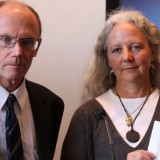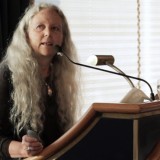On the eve of the expected release of the final report from the Cohen Inquiry into disappearing Fraser River sockeye, retired DFO senior biologist and manager Otto Langer offers his critique of the Commission and his former employer. Langer, the man who blew the whistle on Stephen Harper’s plan to gut the Fisheries Act, was also an expert witness at the Inquiry.
I often noted half way through the Cohen Commission hearings into disappearing Fraser River sockeye in Vancouver in 2011 that I would not hold my breath for the Commission to make any real impact on changing DFO and if we do not rehabilitate DFO we cannot rehabilitate the fishery.
DFO and DFO management has to be rehabilitated in that they are a major problem to overcome in resolving many fishery issues. Cohen did not appear to properly address the DFO management problem but if he is astute and reads between the lines he does have to highlight that as a real problem. I doubt if he will.
Was Cohen advised not to be too critical of DFO? Prime Minister Stephen Harper did resist a full public inquiry and I am certain his thinking was – “if I am to have an inquiry it had better not embarrass my government or my ministers.” DFO did oppose a public inquiry for years until Harper finally gave into the pressure of MP John Cummins (Cummins personal communications 2010).
The Cohen Commission did have great inherent weaknesses. First of all they overloaded their ranks with lawyers and made a public hearing process into an overly controlled and straight-jacketed legal process and at times appeared even more restrictive than a criminal court case. Cohen noted that he did not want the Inquiry room to be a courthouse but that is indeed how it was run. It was not democratic or transparent and was totally control-oriented – a legal community approach that was not in the public nor fishery best interests!
The Commission set up a expert panel and then dismissed it for all the wrong reasons. They badly needed an unbiased technical advisory panel but resorted to select studies done by often unqualified consultants. They did not consult with the public and often ignored those that had legal standing in these issues.
The basis of engagement was not made clear until we were several months into the Inquiry. I was given legal standing but totally obstructed in any attempt to be a witness. The Cohen Inquiry alone determined what they wanted to hear and selected the witnesses accordingly – it was channeled evidence.
Many hours of exam were wasted on irrelevant issues and then when we got into key material directly related to sockeye survival those with standing were most often restricted to a few minutes of cross examination. That was truly unfortunate. It is well known that it is more time efficient to make your point with your own witness than to overturn misleading testimony when one was restricted to a few minutes of cross-exam. Few trials would be run in such a manner.
The Inquiry staff prepared their own background discussion papers that were often in great need of editing and were not factually correct. To make matters worse they then hired a dozen consultants to do their own ‘research’ papers vs. having a technical expert advisory panel. Some of these papers were very non-scientific and a few were actually an embarrassment to science and the Inquiry. In one study, the Commission lawyer even attacked their own hired author so as to distance themselves from the terrible work they had done. Despite that, select studies such as that by Dr. Scott Hinch were excellent.
Certain Inquiry staff at times functioned as inexperienced staff and little wonder that some unqualified consultants were hired and taxpayer money was wasted. The public interest could have been better served if Cohen had designed a Northern Gateway Pipeline-type hearing; i.e. more open, democratic and accountable.
The Commission even appeared to use some witnesses and asked them to present testimony they did not want to present. For instance Dr. G. Hartman got upset with them and told them to get lost and refused to be a witness. Another witness refused to return to the Inquiry and said spending time in his cabin was more relevant!
I did my best to be a witness to get a number of issues before them but was told they “did not want anyone that was critical of DFO”, even though they gave me and ENGOs legal standing and hundreds of thousands of dollars to have legal representation. In one case they wanted one of my studies on Fraser River gravel mining but asked another expert to take my study and rewrite and remove all comments critical of DFO and put his name on it as though he was the author of the study. That was unethical!
A real problem was that at least 70% of the witnesses were from DFO and many were not experts and really presented a smoke-and-mirrors story on how enforcement was done, the new ecosystems approach, etc. This came from experts like DM Dansereau and DFO and DOE Ottawa ‘experts’ on enforcement. Why did the Inquiry require Dr. Bombardier from Environment Canada to appear as their enforcement expert when she had no enforcement background and only had been in her job for six months? She was indeed opposed to enforcement as a compliance tool. Often the testimony was misleading and very political in nature.
Considering the above – why should one expect a $26million high quality and balanced product that will make a big difference in the ocean and river where the fish live? I do not feel Cohen will fully address the DFO and a politically directed decision making process where most management problems are most often born. If Cohen does make some good conclusions and recommendations (and he will), how can that affect or direct what Harper and DFO will do, considering the passing of Bill C-38 in June 2012 and the changes they made since the Inquiry concluded.
We have just learned that we will not have any habitat protection staff and DFO habitat protection offices on the sockeye salmon Fraser River migratory and spawning/rearing areas anywhere on the Fraser River other than 5 junior staff in Kamloops. Staff and offices in Prince George, Blue River, Salmon Arm, Quesnel, Williams Lake, Lillooett, Chilliwack and New Westminster will be eliminated. If Cohen knew that this was about to happen, his report could be different, i.e. some of his evidence is already well out of date. Any significant (permanent ) habitat destruction incident on the sockeye system will now be responded to out of Winnipeg or Burlington.
Would Justice Cohen have been happy with that arrangement?
Cohen and staff could have done a much better job in hearing more balanced evidence and he is now stuck with the evidence he has heard. Some evidence was very sub-standard, i.e. habitat, ecosystems effects, enforcement, etc. Despite that comment, some of the evidence was complete, such as wild salmon policy, temperature issues, fish farming, etc. However, in that the hearing was overly directed and it was a closed process as dictated by Cohen staff, some of the best evidence was not heard, such as the great political interference in undermining science, terrible DFO hiring practices, overly-centralized directions from Ottawa, management shortcomings, etc.
Finally, Cohen will be hog tied on some issues, such as global warming and temperatures, which are very valid and priority issues. What can he say other than it is an issue and we need more science as government cuts this capability in DFO and elsewhere in government? Cohen will be barking up an empty tree as the Harper (and BC and Alberta) governments do everything to promote more fossil fuel development that will facilitate global warming and undermine long-term salmon survival. Many of the salmon survival issues have to be addressed at the international, federal and BC levels. Under our present system of governance and cooperative problem solving, Cohen will make little impact on this much-needed larger, ecosystem-wide approach to protect and conserve life such as sockeye salmon on this planet.
DFO and the Harper Government really cut Cohen off at the knees and I feel they have treated this Commission with contempt and their actions have left Cohen and his report already a bit on the back shelf. DFO can dismiss much of Cohen in that they can now say that some of his information is out of date and DFO has already directed many changes to re-direct where DFO is going.
I do hope I am wrong in believing that the Cohen report will do little to change DFO and the politics related to protecting our natural world and salmon survival. The politics have created a very tilted playing field and as with many other inquiries tackling this salmon problem, one will probably soon forget about the Cohen Inquiry as we have done with the John Fraser and Justice Williams reports.
We must appreciate that the Cohen Inquiry is the really big Granddaddy inquiry into this issue but can it or will it recommend solutions or see action on its recommendations to solve the really big issues facing sockeye and most fishery issues? A report may be great but it means little if it does not effect change, i.e. implementation is the real challenge!
The power to make those changes is now in the hands of government and that is where we can even have much greater reservations of what can or will happen. DFO will probably pick off the ripe low fruit that will support what they want to do and ignore the rest. Meanwhile, DFO and the Harper government will stubbornly go in their own direction as determined by the rigid control and less than scientific approach as seen in many other similar matters in the past few years.
The comments of the ‘original author’ of the Inquiry, ex Conservative MP and fisheries critic John Cummings should be interesting. He seemed to give up on it soon after it began. It is odd that we can sometimes build a process from a good idea but it soon gains its own life and goes in another direction and we then feel we have created a monster that will not fulfill the basic needs it was designed to address.
The Inquiry spent millions collecting thousands of documents, and putting them into a digital library which was guarded with great secrecy and unavailable to the public. In that the Inquiry is now over and this is a taxpayer-funded product, it must be arranged for that large and expensive collection be put into a public library.
Meanwhile the taxpayer struggles to pay for this multimillion dollar Inquiry into a problem that should address the many fishery problems for future generations so they can enjoy the existence of what is a key part of BC – abundant salmon populations in our healthy rivers.
Otto E. Langer, Fishery Biologist and Aquatic Ecologist – Oct. 27, 2012




